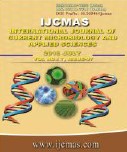


 National Academy of Agricultural Sciences (NAAS)
National Academy of Agricultural Sciences (NAAS)

|
PRINT ISSN : 2319-7692
Online ISSN : 2319-7706 Issues : 12 per year Publisher : Excellent Publishers Email : editorijcmas@gmail.com / submit@ijcmas.com Editor-in-chief: Dr.M.Prakash Index Copernicus ICV 2018: 95.39 NAAS RATING 2020: 5.38 |
Castor (Ricinus communis L.) experienced serious declines in yield caused by wilt pathogen Fusarium oxysporum f.sp. ricini. To control the wilt pathogen, commonly fungicides are used, which cause undesirable toxic effect on the environment. To minimize the pollution impact, there is an urgent need to develop alternative ecofriendly strategies. Therefore, to fill these knowledge gaps and to investigate potential botanical's efficacy on the wilt pathogen F. oxysporum f.sp. ricini, an in vitro bioassay was conducted. Twenty-six botanicals were extracted at two different concentrations viz. 5 percent and 10 percent and were evaluated against the castor wilt pathogen, using poisoned food technique in terms of percent inhibition. The botanical henna showed significant (93.88 percent) inhibition of pathogen at 10 percent concentration, followed by neem cake (89.90 percent), ashoka (88.05 percent) and aloe (87.68 percent). Whereas at 5 percent concentration, botanical neem cake showed maximum inhibition (88.42 percent) followed by aloe (85.46 percent) and henna (83.70 percent). The plant extracts neem cake, aloe and henna significantly inhibited the pathogen growth at both the concentrations, indicating botanicals as potential future bio-fungicides. However, still further research needed to better understand the mechanisms underlining pathogen inhibition by plant extracts. Hence, the current study put forth that botanical based protection could be a potential alternative for the sustainable management of F. oxysporum f.sp. ricini.
 |
 |
 |
 |
 |